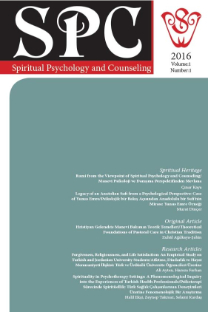Transaksiyonel Analiz Teorisi ve Maneviyat
Son yıllarda psikoloji kuram ve yaklaşımlarının maneviyat ögesi ile birlikte ele alındığı çalışmalara büyük ölçüde önem verilmiş, gerçekleştirilen araştırma ve derlemelerle insanın manevi yönüne ışık tutulmaya çalışılmıştır. Bu çalışmada, kişiler arası ilişkiler teorisi olarak Transaksiyonel Analiz’in maneviyata bakış açısı ve maneviyatın Transaksiyonel Analiz içinde ne ölçüde yer bulduğu açıklanmak istenmiştir. Temelde Berne ve onu takip eden araştırmacıların görüşlerine yer verilmiştir. Transaksiyonel Analiz’in maneviyatı içine yerleştirdiği “otonomi” kavramı üzerinde durularak kendini aşma deneyimine değinilmiştir. Transaksiyonel Analiz penceresinden insan gelişimi ve maneviyata yönelik bir çerçeve oluşturularak transaksiyon ve ego durumları ekseninde Transaksiyonel Analiz yapılarına ve maneviyata yönelik bir bakış açısı sunulmuştur. Transaksiyonel analiz içerisinde özellikle ailelerle çalışma sürecinde etkili olan aile prizmaları maneviyat ekseninde açıklanmıştır. Ayrıca, danışma sürecinde danışanın getirdiği manevi unsurlarla ilgili olarak Transaksiyonel Analistlere yol gösteren Pilgrem Modele ilişkin kısa ve özet bilgiler sunulmuştur. Bu çalışmada Transaksiyonel Analiz teorisi ve terapistlerinin aslında maneviyatı danışma sürecinin dışında tutmadıkları, ele alınan tüm kavramlarda olmasa da özellikle ego durumları, yakınlık ve otonomi odağında maneviyata değindikleri gösterilmek istenmiştir. Bu amaç doğrultusunda, gerçekleştirilen araştırmalara yer verilerek derleme yoluyla Transaksiyonel Analiz teorisinden maneviyata bir pencere açılması amaçlanmıştır.
Anahtar Kelimeler:
Transaksiyonel analiz, Otonomi, Yakınlık, Kendini aşma
Transactional Analysis Theory and Spirituality
A great deal of importance has recently been given to studies dealing with the spiritual aspect of psychological theories and approaches; the aim has been to shed light on the spiritual aspect of humanity through these conducted researches and compilations. The current study aims to explain the perspective of transactional analysis on spirituality in terms of the theory of interpersonal relations and the extent of spirituality on the understanding of transactional analysis. Mainly the views of Berne and the researchers following in his footsteps have been taken into consideration. The experience of self-transcendence has been referenced by elaborating on the concept of autonomy, which occurs in spirituality through transactional analysis. By forming a framework over the transactional analysis view on spirituality, a perspective is offered towards transactional analysis patterns and spirituality along the axis of transaction and ego states. Family prisms, which are especially effective in the process of working with families in the understanding of transactional analysis, are clarified along the axis of spirituality. In addition, brief and summary information is presented about the pilgrim model, which guides transactional analysts regarding the spiritual elements a client brings during the consultation process. This study aims to show that the understanding of transactional analysis is a theory of relations and that therapists do not exclude spirituality from the counseling process but reference spirituality, particularly when focusing on ego states, intimacy, and autonomy, although not on all the concepts discussed along the understanding axis. For this purpose, the study aims to give the point of view on spirituality in transactional analysis theory by compiling the research that has been performed.
Keywords:
Transactional analysis Autonomy, Intimacy, Self-transcendence, Spirituality,
___
- Akkoyun, F. (2001). Transaksiyonel analiz (2nd ed.). İstanbul, NY: Nobel Yayın Dağıtım. Berne, E. (1968). Games people play: The psychology of human relationships (Vol. 2768). London, UK: Penguin. Berne, E. (1988). What do you say after you say hello .New York, NY: Random House. Clark, B. D. (1991). Empathic transactions in the deconfusion of child ego states. Transactional Analysis Journal, 21(2), 92–98. Erikson, E. H. (1993). Childhood and society. New York, NY: W. W. Norton & Company. Erskine, R. G. (1988). Ego structure, intrapsychic function, and defense mechanisms: A commentary on Eric Berne’s original theoretical concepts. Transactional Analysis Journal, 18(1), 15–19. Erskine, R. G., Clark, B., Evans, K. R., Goldberg, C., Hyams, H., James, S., & O’Reilly-Knapp, M. (1994). The dynamics of shame: A roundtable discussion. Transactional Analysis Journal, 24(2), 80–85. Hill, P. C., & Pargament, K. I. (2008). Advances in the conceptualization and measurement of religion and spirituality: Implications for physical and mental health research. American Psychologist, 58(1), 64–74. James, M. (1981). Transactional analysis in the 80's: The inner core and the human spirit. Transactional Analysis Journal, 11(1), 54–65. James, M., Jongeward, D., & Karpman, S. B. (1971). Born to win: Transactional analysis with gestalt experiments (pp. 64–65). Reading, MA: Addison-Wesley Publishing Company.Kandathil, G., & Kandathil, C. (1997). Autonomy: Open door to spirituality. Transactional Analysis Journal, 27, 24–27. Lawrence, C. (1983). Redecision and repentance: Reframing redecision work for the religious client. Transactional Analysis Journal, 13(3), 158–162. Massey, R. F., & Dunn, A. B. (1999). Viewing the transactional dimensions of spirituality through family prisms. Transactional Analysis Journal, 29, 115–129. Mellacqua, Z. (2016). When spirit comes to mind: Furthering transactional analysis understandings of spirituality in health and psychopathology. Transactional Analysis Journal, 46(2), 149–163. Milnes, P. (2017). The Pilgrim model. Transactional Analysis Journal, 47(3), 203–217. Nelson, J. M. (2009). Psychology, religion, and spirituality. New York, NY: Springer Science & Business Media. Pargament, K. I. (2002). The bitter and the sweet: An evaluation of the costs and benefits of religiousness. Psychological inquiry, 13(3), 168–181. Sandle, R. (2019). Hidden in plain sight: Spirituality in transactional analysis. Transactional Analysis Journal, 49(2), 102–113. Solomon, C. (2003). Transactional analysis theory: The basics. Transactional Analysis Journal, 33(1), 15–22. Stewart, I. (1996). Developing transactional analysis counselling (Vol. 7). Newbury Park, CA: Sage. Trautmann, R. L. (2003). Psychotherapy and spirituality. Transactional Analysis Journal, 33(1), 32–36. Wilson, E. (2012). Emotions and spirituality in religions and spiritual movements. Lanham, MD: University Press of America.
- ISSN: 2458-9675
- Yayın Aralığı: Yılda 3 Sayı
- Başlangıç: 2016
- Yayıncı: Halil Ekşi
Sayıdaki Diğer Makaleler
Mine SAYIN, İbrahim Halil DEMİR, Füsun EKŞİ
Serra DİNÇ, İbrahim Halil EKŞİ
Cezaevi Deneyimi Olan Madde Bağımlılarının Maneviyat Algısı: Fenomenolojik bir Çalışma
İsa CEYLAN, Liam METCALF-WHITE
Maneviyatın ve Manevi Yönelimli Terapötik Müdahalelerin Şizofreni Hastaları Üzerindeki Etkisi
Ultramodern Psikoloji: Kültür, Din, Algısal Bilim ve Nöroteoloji ile bir Tasavvur İnşası
Sanat Terapisinde Manevi Boyut
A Critical Approach to Freud and Psychoanalysis
Kabul ve Kararlılık Terapisi (ACT) Bağlamında Maneviyat
